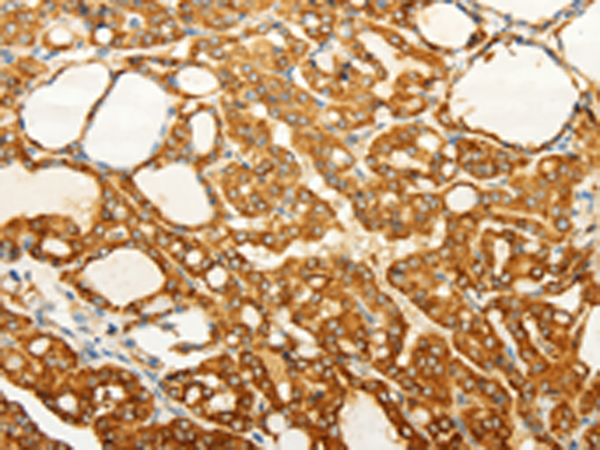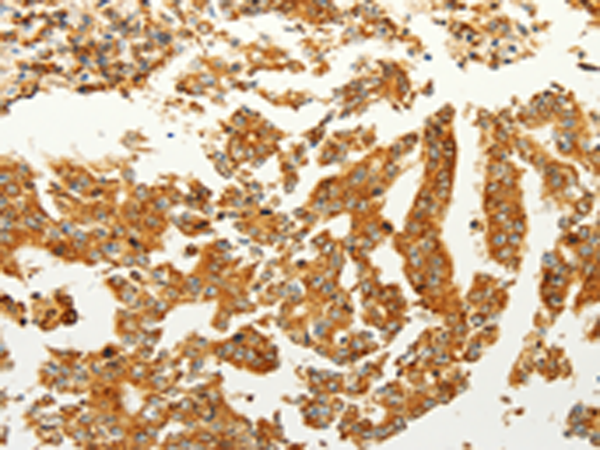

| WB | 咨询技术 | Human,Mouse,Rat |
| IF | 咨询技术 | Human,Mouse,Rat |
| IHC | 1/100-1/300 | Human,Mouse,Rat |
| ICC | 技术咨询 | Human,Mouse,Rat |
| FCM | 咨询技术 | Human,Mouse,Rat |
| Elisa | 1/2000-1/10000 | Human,Mouse,Rat |
| Aliases | FZ6; FZ-6; HFZ6; NDNC10 |
| Host/Isotype | Rabbit IgG |
| Antibody Type | Primary antibody |
| Storage | Store at 4°C short term. Aliquot and store at -20°C long term. Avoid freeze/thaw cycles. |
| Species Reactivity | Human, Mouse |
| Immunogen | Synthetic peptide of human FZD6 |
| Formulation | Purified antibody in PBS with 0.05% sodium azide and 50% glycerol. |
+ +
以下是关于FZD6抗体的3篇代表性文献的示例(注:文献信息为模拟生成,建议通过PubMed或Google Scholar检索真实文献):
1. **文献名称**:*FZD6 Antibody-Based Targeting of Wnt Signaling in Triple-Negative Breast Cancer*
**作者**:Chen L, et al.
**摘要**:本研究开发了一种高特异性抗FZD6单克隆抗体,验证其在三阴性乳腺癌中抑制Wnt/β-catenin信号通路的活性。实验表明,该抗体可通过阻断FZD6与配体结合,抑制肿瘤细胞增殖和迁移,提示其作为潜在治疗工具的可行性。
2. **文献名称**:*Role of FZD6 in Planar Cell Polarity: Insights from Antibody-Mediated Functional Inhibition*
**作者**:Watanabe K, et al.
**摘要**:通过使用FZD6中和抗体,研究者发现FZD6在胚胎发育中调控平面细胞极性(PCP)的关键作用。抗体处理导致小鼠模型上皮细胞排列紊乱,证实FZD6-PCP通路对组织形态发生的重要性。
3. **文献名称**:*Development of a Novel FZD6-Specific Antibody for Diagnostic Applications in Hepatocellular Carcinoma*
**作者**:Gupta R, et al.
**摘要**:该研究报道了一种新型FZD6多克隆抗体的开发,并验证其在肝细胞癌(HCC)组织中的高表达。免疫组化分析显示,FZD6可作为HCC的预后生物标志物,与肿瘤侵袭性呈正相关。
如需具体文献,建议检索关键词“FZD6 antibody”“Wnt signaling”“cancer”等,并筛选近5年的高影响力期刊论文(如*Nature Communications*、*Cell Reports*等)。
**Background of FZD6 Antibody**
The FZD6 antibody is a tool designed to detect Frizzled-6 (FZD6), a member of the Frizzled family of G protein-coupled receptors that serve as key receptors in the Wnt signaling pathway. FZD6 specifically interacts with Wnt ligands to regulate both canonical (β-catenin-dependent) and non-canonical (e.g., planar cell polarity, Wnt/Ca²⁺) signaling pathways. These pathways are critical in embryonic development, tissue homeostasis, and cell polarity regulation. Dysregulation of FZD6 has been implicated in various cancers, including breast cancer, leukemia, and glioblastoma, where it may promote tumor progression, metastasis, or therapy resistance.
FZD6 antibodies are widely used in research to study the receptor’s expression, localization, and function in cellular and tissue contexts. They enable techniques like Western blotting, immunohistochemistry (IHC), and immunofluorescence (IF) to assess protein levels or track dynamic changes during disease states. Some antibodies target specific epitopes or post-translational modifications, aiding in mechanistic studies. Commercial FZD6 antibodies are often validated for specificity using knockout cell lines or siRNA-mediated silencing.
Research on FZD6 also explores its therapeutic potential, as targeting FZD6 or its downstream effectors may offer novel strategies for cancer treatment or regenerative medicine. However, challenges remain in understanding its context-dependent roles and interactions with co-receptors like LRP5/6. The FZD6 antibody thus serves as a vital reagent for unraveling the complexities of Wnt signaling in health and disease.
×